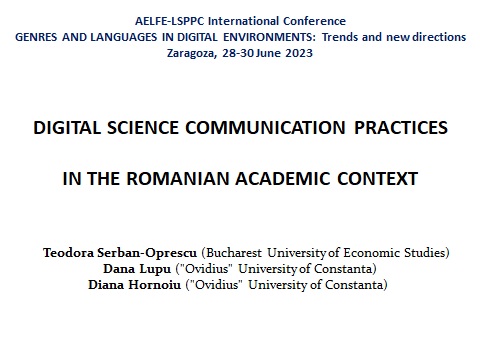Our project partners from Bucharest University of Economic Studies (ASE) and Ovidius University at Constanta shared their research work on digital science communication practices at the 21st annual conference of the European Association of Languages for Specific Purposes (AELFE2023) and the 7th Conference of the Asia-Pacific LSP & Professional Communication Association (LSPPC7).

Abstract
The Erasmus+ Project “Digital language and communication resources for EU scientists” (DILAN) is meant to bring a significant contribution to the international efforts to open science to wider publics, both specialized and lay. In order to reach this goal, DILAN sets out to develop and promote new practices and methods in the field of science communication, with a focus on the digital component. In this presentation, we report on the survey results regarding the dissemination practices in the Romanian higher education environment. The first study was carried out by the Campus Iberus digital science action group and it had the aim of investigating how Spanish scientists communicate their work in digital media (Perez-Llantada et al, 2022). As partners in the International ”DILAN” Consortium, the two Romanian universities involved in the project, namely the Bucharest University of Economic Studies and ”Ovidius” University of Constanța, have replicated the survey using the questionnaire both in English and translated into Romanian. The survey comprised 247 responses from academics, researchers and PhD students, collected jointly by the above mentioned universities. The respondents were from fields of activity such as Humanities, Social Sciences and Arts, STEM, Economics, Law and Administrative Studies, Pharmacy, Medicine and Dental Medicine, as well as other areas of research, among which Theology, Physical Education and Sport. The survey was based on relevant criteria including professionals’ experience in disseminating science, the genres and media they prefer for this purpose, important aspects to consider when making research outcomes available to different publics. The analysis of the results has led to important conclusions as concerns the practices of science dissemination within the Romanian academic context, which represent the basis for the comparison with the results from the Spanish academic context and the French academic context.
